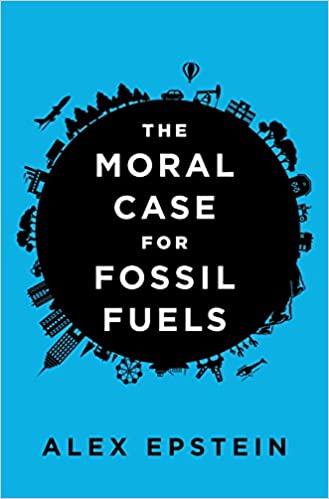Book Review: Moral Case for Fossil Fuels
Published:
Alex Epstein’s The Moral Case for Fossil Fuels argues that oil, gas, and coal are net contributors to human welfare and should continue to be promoted. The book defends fossil fuels against criticisms of pollution and sustainability while criticizing renewable energy sources. It concludes with a call to embrace fossil fuels as a moral good.

Here’s the paperback and audiobook.
Utility: ⭐ (1/5)
Writing: ⭐⭐⭐ (3/5)
Epstein is a good communicator and storyteller. He is good at clearly explaining ideas and molding arguments. His references to personal anecdotes and real-world examples are timely and illuminating. The book was, at the very least, easy to read.
But his wordsmithing skills don’t make up for the lackluster content. Epstein repeatedly performs bait-and-switches, presenting a mere correlation between fossil fuel use and forms of progress, and then seamlessly transition to causal language. The central claim - that fossil fuels promote beneficial industrial development - is dubious and doesn’t justify future use. The secondary claim - that renewable energy sources can’t fill the gap - lacks depth and ignores more recent technology.
The highlight of the book was the shoutout to my alma mater, Montgomery Blair High School, of which he is an alumnus. At least we have something in common.
Notes
- Environmentalists like Bill McKibben’s have repeatedly used doomsday predictions to justify restrictions on fossil fuels, only for their projections to be wildly off. Even academic climate change models failed to predict the relatively mild climbs in temperature post-2000.
- Some environmentalist value nature about all else, even calling for humans to die off or not have children. The case for fossil fuels rests on a humanist moral code that values the environment insofar as it benefits humanity.
- Renewables like solar and wind suffer from geographic constraints, intermittency, and diluteness. Only fossil fuels, nuclear power, and (to a lesser extent) hydroelectricity can reliably power the modern world.
- Fossil fuels have enabled vast increases in energy usage, improving quality of life. The billions of people today with little or no access to electricity suffer greatly. Restricting fossil fuel use denies crucial relief to these people.
- The greenhouse effect has a corresponding fertilizer effect, where increased CO2 concentrations increase crop yields. On net, some level of warming may be beneficial to humanity.
- The environment is naturally dangerous. The energy derived from fossil fuels has enabled us to protect ourselves from floods, heatwaves, earthquakes, pollution, and more.
- There are enough reserves of fossil fuels that we don’t need to be worried about sustainability. New technology will enable us to extract deeper reserves.
- In case we are wrong about fossil fuels, we can find ways to reasonably restrict fossil fuel use, clean energy production, and balance costs and benefits. We shouldn’t jump the gun and demonize fossil fuels from the start.
